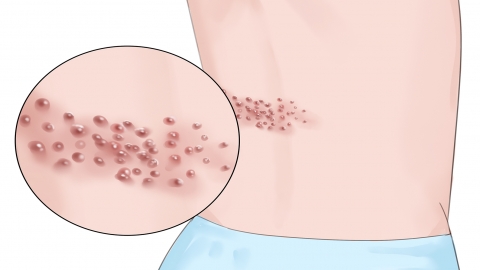What to do about postherpetic neuralgia (the nerve pain complication of shingles)
Generally, postherpetic neuralgia may be caused by factors such as weakened nerve repair due to aging, delayed treatment during the acute phase of herpes zoster, persistent nerve inflammation, nerve injury fibrosis, or concurrent peripheral neuropathy. It is recommended to seek timely medical attention, identify the underlying cause, and improve the condition under a doctor's guidance through general treatment, medication, or surgical interventions. A detailed explanation is as follows:

1. Weakened Nerve Repair Due to Aging: With advancing age, the regenerative capacity of nerve cells declines. After nerve damage caused by the varicella-zoster virus, nerve repair becomes difficult, making long-term pain more likely. In daily life, avoid excessive fatigue, ensure 7-8 hours of sleep per day, and consume foods rich in high-quality protein such as eggs and milk to provide nutrients for nerve repair.
2. Delayed Treatment During the Acute Phase of Herpes Zoster: Failure to initiate antiviral treatment promptly during herpes zoster outbreaks leads to ongoing destruction of nerve tissue by the virus, worsening nerve damage and resulting in postherpetic neuralgia. During the acute phase, follow your doctor's instructions to take antiviral medications such as acyclovir tablets, valacyclovir tablets, or famciclovir tablets to shorten the course of the disease.
3. Persistent Nerve Inflammation: Inflammation caused by the virus persists and repeatedly stimulates pain-sensing nerve endings, leading to recurrent pain. Patients should follow medical advice to use medications such as gabapentin capsules, pregabalin capsules, or mecobalamin tablets to relieve pain and support nerve health.
4. Nerve Injury Fibrosis: Following nerve damage, fibrous tissue proliferates and compresses surrounding pain-sensing nerves, intensifying and prolonging pain. Under medical guidance, low-frequency electrical stimulation therapy can be used to improve local blood circulation. If pain is severe, nerve block procedures can be performed by injecting medication to interrupt pain signal transmission, providing rapid pain relief.
5. Concurrent Peripheral Neuropathy: Nerve damage following herpes zoster may involve peripheral nerves, causing abnormal nerve conduction, expanded pain areas, and increased pain intensity. Follow your doctor's instructions to use medications such as vitamin B1 tablets, vitamin B12 injections, or epalrestat tablets to improve nerve function. If pharmacological treatment proves ineffective, radiofrequency ablation of the dorsal root ganglion may be performed to disrupt abnormal pain pathways and alleviate pain.
In daily life, maintain emotional stability and avoid anxiety or tension that may intensify pain perception. Choose loose, soft clothing to reduce friction on painful areas. Maintain a regular routine and engage in mild physical activity such as walking to promote recovery.







